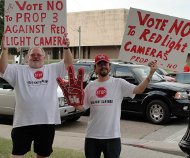Decision Overturning Houston Anti-Camera Referendum Appealed
The battle over the Houston, Texas red light camera program returned to the legal spotlight Monday. A majority of voters agreed with Francis M. Kubosh and Randall Kubosh in November that the automated ticketing machines should be removed, but a federal judge intervened earlier this month and overturned the election ( view ruling). The Kuboshes filed a reply brief with the US Court of Appeals for the Fifth Circuit Monday seeking to restore the result of the public vote.
“The issues are important to the electorate of the nation’s fourth largest city, Houston, where a 52.8 percent majority voted ‘No’ to a ballot proposition hand-crafted by the city attorney, approved by the mayor, and ratified by all but one member of the city council,” wrote David Allen Furlow, attorney for the Kuboshes. “The outcome of this case will affect the complex web of relationships among municipal governments, their citizens, and private contractors throughout Texas and the nation.”
The Kuboshes argue that US District Judge Lynn N. Hughes erred as a matter of law by agreeing to the pretense of having the city of Houston, which supports cameras, sue American Traffic Solutions (ATS), which operates cameras, as if there were an actual dispute between the two. Hughes, who has served on the bench for 25 years with Judge David Hittner, agreed within 48 hours to hear a request for a restraining order to keep the ATS cameras up filed on behalf of Judge Hittner’s son, ATS General Counsel George Hittner. Hughes set a hearing on the matter for the day after Thanksgiving in a lightning move designed to exclude the initiative sponsors, who were never notified. During the proceedings, Hughes did not hide his true feelings.
“So, the essence of the popular revolt was people in Houston want to run red lights,” Judge Hughes said on November 26, according to the record. “I mean, the highway department has cameras up and down the freeways and on some side streets.”
Hughes accordingly denied a motion by the Kuboshes requesting to intervene in the case, the order which the Kuboshes now appeal. Hughes only allowed the Kuboshes to file amicus briefs in the case, denying them the right to object to evidence and make arguments and motions without the leave of the court. Under Texas law, courts must permit the intervention of a qualified voter to defend a measure election in an election contest.
“Here, the city has lost a case it purports, falsely, to ‘zealously defend,’ enabling it to continue pocketing $10 million in annual red light camera revenues its mayor does not want to lose,” Furlow wrote. “Because the city waived the statutory and constitutional defenses appellants preserved, no one but appellants can defend the Proposition 3 election they petitioned for, organized, funded with $200,000 of their family’s money, and won at the polls. Only appellants can protect their and their fellow citizens’ constitutional and statutory right to reform city government through charter amendment elections.”
ATS and Houston’s city attorney are now arguing together that the case that invalidated the election was merely a contract dispute to which the Kuboshes were not a party.
[Courtesy: Thenewspaper.com]
More by The Newspaper
Latest Car Reviews
Read moreLatest Product Reviews
Read moreRecent Comments
- EBFlex No they shouldn’t. It would be signing their death warrant. The UAW is steadfast in moving as much production out of this country as possible
- Groza George The South is one of the few places in the U.S. where we still build cars. Unionizing Southern factories will speed up the move to Mexico.
- FreedMike I'd say that question is up to the southern auto workers. If I were in their shoes, I probably wouldn't if the wages/benefits were at at some kind of parity with unionized shops. But let's be clear here: the only thing keeping those wages/benefits at par IS the threat of unionization.
- 1995 SC So if they vote it down, the UAW gets to keep trying. Is there a means for a UAW factory to decide they no longer wish to be represented and vote the union out?
- Lorenzo The Longshoreman/philosopher Eri Hoffer postulated "Every great cause begins as a movement, becomes a business, and ends up as a racket." That pretty much describes the progression of the United Auto Workers since World War II, so if THEY are the union, the answer is 'no'.


































Comments
Join the conversation
I wonder what those court justices think when they sing, "O'er the land of the free, and the home of the brave"?